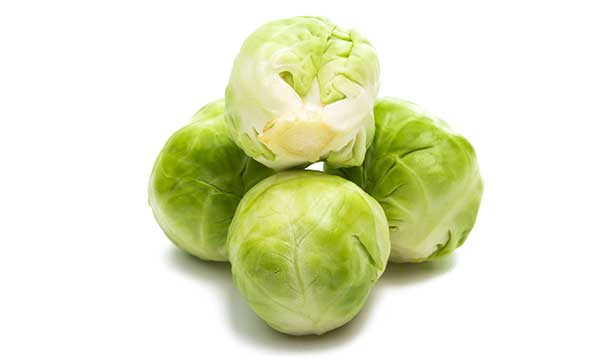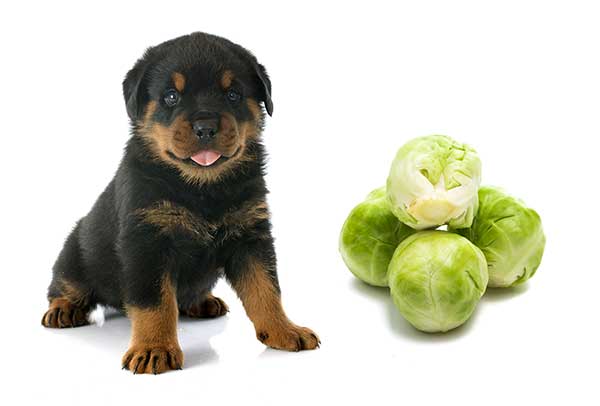Like most pets, dogs are insanely curious about human foods. Unfortunately, this curiosity often leads to dangerous encounters with certain people foods that vets discourage for dogs.
Now, you may have noticed that your canine friend gets all worked up whenever it sees you enjoying your dish of Brussels sprouts. You may try to ignore him, arguing that dogs have no business eating human foods.
But the more you ignore the dog, the more curious he gets. Before you know it, your pooch has sneaked up behind your back and helped himself to some of the Brussels sprouts in your kitchen shelf.
As a responsible dog owner who’ve always tried to avoid feeding veggies to your canine friend, you could be wondering if Brussels sprouts will cause any immediate harm to your dog. One of the questions that will likely be flying through your mind is, can dogs eat Brussels sprouts?
Answer: Luckily for you (and any other pet parent in a similar situation), dogs can comfortably eat Brussels sprouts. In addition to being perfectly safe for dogs, Brussels sprouts are also packed with essential vitamins and mineral salts, as well as antioxidants and dietary fiber that your pooch can benefit from.
Is It Safe For Dogs To Eat Brussels Sprouts?
Yes, it’s safe to feed Brussels sprouts to your pooch without worrying about the dog suffering any immediate health issues. Of course, there are a few things to keep in mind before feeding these veggies to your canine friend.
Most importantly, remember that Brussels sprouts are plant-based foods. And while dogs can safely snack on plant matter, they’re generally more at home with animal products. Which means that if you must offer Brussels sprouts to your dog, you should only do so in moderation. These vegetables should never replace your dog’s staple diet.
Read on as we uncover some of the health benefits of Brussels for dogs, some possible side effects, and how best to feed these vegetables to your pooch.
More About Brussels Sprouts
Brussels sprouts are vegetables that belong in the Brassicaceae family, which are grown for their edible buds. These vegetables are closely related to cauliflower, kales, and mustard green.

In terms of physical appearance, Brussels sprouts closely resemble miniature cabbages. The vegetables typically grow to a height between 1.5 and 5.0 centimeters.
As their name implies, Brussels were first commercially cultivated in Brussels, Belgium, around the 5th century. But over time, their popularity grew and today, these vegetables are cultivated in various parts around the world. They’re either consumed fresh as part of a nutritious side dish or cooked and eaten as a main course.
Brussels sprouts boast a dense nutritional profile. When raw, these vegetables pack up to 86% water, 9% carbohydrates, and 3% protein.
Remarkably, Brussels sprouts have negligible fat and calorie content, a fact that contributes significantly to their overall popularity.
Essentially, Brussels sprouts contain the following vitamins and mineral elements;
- Vitamin C,
- Vitamin K,
- Vitamin A
- B vitamins, including vitamin B6, thiamine, and folate,
- Dietary fiber,
- Manganese,
- Potassium,
- Iron,
- Magnesium, and
- Phosphorus.
- 8-in-1 Formula – Zesty Paws Multifunctional Bites are functional supplement chews with premium ingredients that support physical performance,…
- Skin Health & Antioxidants – For animals with sensitive skin, this formula contains Cod Liver Fish Oil and Vitamin E to help maintain normal…
- Hip, Joint & Performance Support – Each dog chew features OptiMSM, a premium form of MSM for muscular support, which works synergistically with the…
Last update on 2024-12-17 / Affiliate links / Images from Amazon Product Advertising API
But What Should Dogs Eat?
Many dog owners all over the world have always fallen for the popular misconception that dogs are carnivores. That’s primarily because dogs are classified under the order Carnivora. Nothing can be further from the truth.
The domestic dog, just like his wild cousin, the wolf, is an omnivore. Therefore, they can derive their nutritional elements from a diet comprising both plant and animal.
In fact, dogs did not acquire their omnivorous traits after domestication by man. These animals have been omnivores from the beginning of time. In the wild, dogs thrive on a diet of meat as well as fruits, berries, vegetables, herbs, and even grasses.
But while dogs can eat vegetables and plant-based foods, they’re generally more comfortable with animal protein. That’s why most vets discourage feeding too much fruit and vegetable to dogs. Remember that all said and done, their digestive systems are more efficient at processing meat and some dairy products.
Also, dog owners must establish the safety of any vegetable before feeding it to their canines. While most vegetables may not cause immediate health issues to dogs, some are laced with chemical toxins that might present long-term health complications for them. Thankfully, Brussels sprouts are considered both safe and nutritionally beneficial to dogs.
Health Benefits of Brussels Sprouts for Dogs
1. High in Dietary Fiber
Like most vegetables, Brussels sprouts are high in dietary fiber. 78 grams of cooked Brussels sprouts contain as much as 2 grams of fiber.
Fiber plays an essential role in nourishing your dog’s gut-friendly bacteria. That way, it improves the dog’s digestion, while also keeping the animal free from diseases of the digestive system.
Fiber is also famous for its ability to create a sense of fullness. Mixing a bit of Brussels sprouts into your dog’s main diet can help to regulate the food portions that the animal consumes. That’s an excellent natural remedy against weight gain.
Fiber-rich foods like Brussels sprouts are also known to help with the regulation of bowel movements, especially when it comes to insoluble fiber. Remember that just a little bit of fiber is absorbed in your dog’s stomach. Whatever remains adds bulk to the dog’s stool, leading to increased stool frequency.
By adding bulk to your dog’s stool, the fiber in Brussels sprouts also softens the stool for ease of passage, which helps to relieve digestive conditions like constipation.
Lastly, dietary fiber may also reduce the levels of bad cholesterol in your dog’s bloodstream. On the contrary, it increases the amount of good cholesterol in the animal’s body. The cumulative effects of cholesterol regulation include reduced risks of heart and cardiovascular disease.
- Good Gut Bacteria – These chewables include pawsome probiotic strains such as Lactobacillus acidophilus, L. plantarum, L. brevis, L. fermentum, and…
- Something Yummy for a Happy Tummy! – Probiotic Bites are functional soft chew dog supplements that support gut flora and immune support for your…
- Featuring DE111 – This chewable supplement contains DE111, which is a clinically studied Bacillus subtilis that supports gut health and immune system…
Last update on 2025-01-12 / Affiliate links / Images from Amazon Product Advertising API
2. Might Help With Weight Loss
We’ve already highlighted the important role that dietary fiber plays in terms of preventing weight gain. But dietary fiber isn’t the only compound in Brussels sprouts that might aid weight loss. As we did indicate, the vegetables are also loaded with high water content.
Just like fiber, water produces a feeling of fullness for longer, which is instrumental in regulating the amount of food that your dog eats. In addition to helping with weight loss, the high water content in Brussels sprouts might act as a rehydrating agent.
Perhaps your dog is sick and has lost his appetite. Or he simply can’t seem to drink enough water than he should. Well, there’s no cause for alarm. One of the ways to ensure the animal gets his fair supply of water is by feeding him water-rich foods like Brussels sprouts.

3. Rich in Antioxidants
Antioxidants are complex compounds that lower the risks of oxidative stress in an animal’s cells occasioned by the presence of free radicals in the animal’s body. And Brussels sprouts contain an abundance of these antioxidants.
While Brussels sprout packs several antioxidants, it particularly stands out in its levels of the compound kaempferol. Kaempferol is cited for its anti-inflammatory and antitumor effects. Therefore, giving your dog Brussels sprouts occasionally can lower his risks of developing inflammatory conditions like cancer, as well as other chronic conditions like heart disease.
Vitamin C is another powerful antioxidant in Brussels sprouts. As an antioxidant, vitamin C boosts your dog’s immunity and aid in the production of protein compounds like collagen. Besides protecting your dog from disease, vitamin C also plays a role in the growth and repair of tissues and organs. Plus, the vitamin can improve the ability of your dog’s body to absorb non-heme iron.
ALSO READ: Can Dogs Eat Olives? Everything You Need To Know
4. Might Escalate the Healing Of Wounds
Another potential health benefit of Brussels sprouts for dogs lies in the vegetables’ abundance in vitamin K.
Vitamin K is an essential mineral for coagulation as well as the formation of blood clots. It induces a stoppage in bleeding, thereby escalating the wound healing process.
Brussels sprouts may make a world of difference, whether your canine friend has recently suffered a physical injury, undergone a surgical procedure, or occasionally suffers from a bleeding condition.
Vitamin K also works synergistically with calcium to guard against osteoporosis and other diseases characterized by bone wastage.
5. High in ALA Omega-3 Fatty Acids
Naturally, your dog should derive most of its omega-3 fatty acids from a diet of fish and other seafood. But in cases where these foods are hard to come by, you might consider supplementing the dog’s diet with Brussels sprouts.
These vegetables are loaded with alpha-linolenic (ALA) omega-3 fatty acids, with half a cup of Brussels sprouts boasting as much as 135 mg of ALA.
Some of the health benefits of omega-3 fatty acids in your dog’s body include;
- Lowering blood triglycerides,
- Decelerating cognitive decline,
- Reducing inflammation and
- Lowering insulin resistance.
By lowering blood triglycerides and insulin resistance, the alpha-linolenic (ALA) omega-3 fatty acids in Brussels sprouts may help to keep your dog’s blood sugar levels in check.
Plus, we mentioned how rich these vegetables are in dietary fiber. As much of the fiber moves through your dog’s body undigested, it consequently slows down the absorption of sugar into the dog’s bloodstream. So, fiber works synergistically with ALA omega-3 fatty acids to regulate your dog’s blood sugar levels.
But blood sugar level isn’t the only thing that Brussels sprouts can regulate in your dog. The vegetables also pack significant amounts of potassium and calcium, which are known to mediate the effects of sodium and calcium, respectively.
Excess sodium in your dog’s body might lead to sodium ion poisoning, a condition that could be fatal if it goes untreated. On the other hand, excess calcium in your dog’s system is a risk factor for kidney conditions, such as kidney stones.
And that begs the questions, can a diabetic dog eat Brussels sprouts? What of dogs with kidney disease, can dogs with kidney disease eat Brussels sprouts?
The answer is yes to both questions. As we’ve just mentioned, Brussels sprouts contain potassium that stabilizes your dog’s blood sugar level, which is beneficial to diabetic dogs. The magnesium content in Brussels sprouts helps to neutralize the effects of calcium, thereby lowering the risks of kidney failure caused by diseases like kidney stones.
Evidently, there are numerous ways your dog can benefit from snacking on Brussels sprouts occasionally. Perhaps you’ve always been wondering, are Brussels sprouts good for dogs?
Based on the potential health benefits highlighted above, these vegetables are definitely okay for your pooch. However, it’s only fair that you also acquaint yourself with any possible side effects of Brussels sprouts for dogs.
We will review a few of these side effects later on. For now, your immediate concern should be how best to prepare Brussels sprouts to your canine friend.
How to Serve Brussels Sprouts to Your Dog
One great thing about Brussels sprouts is that it’s one of the vegetables that are easiest to add to your dog’s diet. You can incorporate it into the dog’s main meal or as a side dish. You can also choose to cook the vegetable or offer it to your pooch raw. But can dogs eat Brussels sprouts raw?
Yes, dogs can safely eat Brussels sprouts raw. By offering raw Brussels sprouts to your dog, you’re assured that the animal will benefit from most of the nutritional elements in these vegetables.
However, there are a few things to keep in mind when offering raw Brussels sprouts to your pooch.
✔ Only feed fresh and ripe Brussels sprouts to your dog; avoid white or wilted leaves.
✔ Separate the buds and fresh leaves from the stalk.
✔ Wash the vegetables thoroughly to remove any debris, bacteria, parasites, or chemical toxins that could be present in the leaves or buds.
✔ Cut the vegetables into bite-size portions to prevent your dog from choking on them.
✔ To help your dog enjoy raw Brussels sprouts, you can consider mixing the vegetable into the dog’s regular food.
Now, while feeding raw Brussels sprouts to your dog ensures that he enjoys many of the mineral elements in these vegetables, there are inherent risks to watch out for.
⚠️ For instance, your pooch might still find the vegetable a bit tough to chew; hence, choke on it. The dog may also dislike the taste of raw Brussels sprouts. Most importantly, raw Brussels sprouts might contain harmful pathogens in their leaves and buds.
Therefore, the safer way to serve Brussels sprouts to your canine friend is to cook the vegetables first. So, maybe you’ve always wondered, can dogs have cooked Brussels sprouts?
Yes, feeding cooked Brussels sprouts to your canine friend is actually considered the safer alternative to serving the vegetables to the dog raw.
But even if you choose to serve cooked Brussels sprouts to your dog, ensure that you follow the basic preparations we’ve highlighted above. Start by removing all the tough components of the vegetable, which include the stem, roots, and stalks.
Some dog owners may wonder, can dogs eat Brussels sprout stalks? And what about the leaves, can dogs eat Brussels sprout leaves?
As we’ve just highlighted, avoid giving your dog Brussels sprouts roots, stalks, or stems. That’s for the simple reason that these parts are too tough for the dog to chew. Instead, insist on the leaves and buds. However, the leaves and buds must also be fresh and not wilted.

The next step when cooking Brussels sprouts for dogs is to wash the vegetables thoroughly, then cut them into bite-sized portions.
When it comes to the actual cooking, there are numerous ways of preparing Brussels sprouts for human consumption. You can boil, steam, grill, stir-fry, slow-cook, or roast the vegetables. But when it comes to cooking Brussels sprouts for your canine friend, only a handful of the above cooking methods apply.
So, can dogs eat steamed Brussels sprouts or should I consider boiling, frying, and roasting the vegetables instead?
The best ways to prepare Brussels sprouts for your dog is by steaming, boiling, or microwaving the vegetable. Out of these three recommended methods, steaming and microwaving are preferable, as they’re quicker and do not destroy many of the nutrients in these vegetables.
Overcooking Brussels sprouts may render them too soft, causing the buds to develop a strong, pungent smell. This odor is attributed to a sulfur compound in the vegetables, known as glucosinolate sinigrin.
Avoid serving fried or roasted Brussels sprouts to your dog as you could expose the animal to dangerous levels of fat. Most importantly, microwave or steam Brussels sprouts for your pooch without adding any salt or spices like pepper, onions, and garlic.
When done, you can serve the vegetable to your dog either as a standalone dish, or mix it into the dog’s regular food.

Another popular question regarding Brussels sprouts and dogs is, can dogs eat frozen Brussels sprouts?
Since Brussels sprouts are deemed safe for dogs, you can freely stock up on these vegetables in your refrigerator. However, when serving frozen Brussels sprouts to your pooch, ensure that you warm the vegetables a bit. Feeding too cold Brussels sprouts to your dog can cause teeth sensitivity.
ALSO READ: Can Dogs Eat Asparagus? Safe Or Not?
Potential Side Effects of Brussels Sprouts for Dogs?
We’ve reviewed numerous potential health benefits of Brussels sprouts for dogs. However, there are a few side effects that you might expect.
Some of those include;
1. Flatulence
Brussels sprouts contain a compound known as isothiocyanate, which helps to process food and waste throughout your dog’s digestive tract. However, this very compound is infamous for producing gas.
2. Upset stomach and diarrhea
Some dogs are highly intolerant to Brussels sprouts and could develop an upset stomach. Also, the high content of dietary fiber in Brussels sprouts might produce a laxative effect, leading to vomiting, diarrhea, and dehydration.
So, are Brussels sprouts bad for dogs? Seemingly, the side effects of Brussels sprouts for dogs pale in comparison to the expected health benefits. Therefore, it’s unreasonably to conclude that Brussels sprouts are bad for dogs.
Conclusion
Brussels are some of the most nutritious vegetables out there. They also happen to be safe for dogs. But like most plant-based foods, you want to feed Brussels sprouts to your canine friend in moderation.
And if your dog is averse to the idea of Brussels sprouts, you might consider equally healthy and nutritious alternatives like cucumbers, carrots, and spinach.
Checkout Our Favorite Dog Products
1. BEST PUPPY TOY
We Like: Snuggle Behavior Toy with Heart Beat & Heat Pack – Ideal toy for new puppies.
2. BEST DOG TRAINING PROGRAM
We Like: Doggy Dan The Online Dog Trainer – Stop any dog problem and raise the perfect puppy with The Online Dog Trainer.
3. BEST FOOD FOR DOGS AND PUPPIES
We Like: Victor Super Premium Pet Food – Ideal for growing puppies and pregnant or lactating females. Also provides sustained energy for sporting dogs and dogs with high physical demands.
4. BEST DOG DNA TEST
We Like: Embark Dog DNA Test – Embark screens for over 250 dog breeds + tests for 170+ genetic diseases including MDR1 drug sensitivity, glaucoma, degenerative myelopathy, and dilated cardiomyopathy, some of the most common adult-onset diseases in dogs.
5. BEST DOG PUZZLE TOY
We Like: Outward Hound Interactive Puzzle Toy – Every dog loves chasing squirrels at the park. The Outward Hound Hide-a-Squirrel Puzzle Toy gives your dog the same feeling as though he was outdoors chasing live squirrels.




